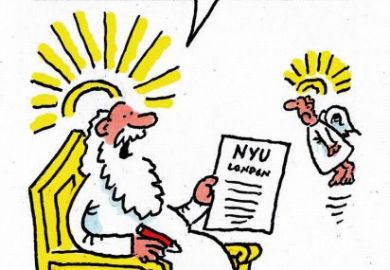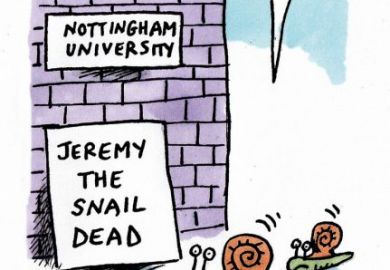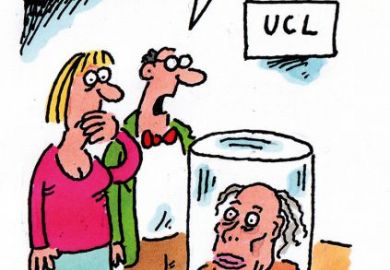
A University of Cambridge student has hit out at the “intellectual dishonesty of the mainstream media” after receiving racist and sexist abuse for criticising the lack of black authors taught at the university. Lola Olufemi, the women’s officer at Cambridge University Students’ Union, was targeted after her photograph appeared on the front page of The Daily Telegraph on 24 October with the caption: “Student forces Cambridge to drop white authors”. In a small correction on page 2 of the 26 October edition, the Telegraph said that it had “incorrectly stated” that the university would replace white authors with black ones, adding that the “proposals were in fact recommendations”. Those proposals contained in an open letter to Cambridge’s English department, signed by Ms Olufemi, did not call for any replacement of white authors, it further clarified. Ms Olufemi told The Guardian on 26 October that the coverage was designed to incite hatred. “Hypervisible black and brown student activists on the left” have their “attempts to make progressive change…misconstrued, taken out of context and reframed to make us into targets of racialised and gendered harassment”, said Ms Olufemi.
The story of Chris Heaton-Harris – the pro-Brexit Conservative MP who wrote to vice-chancellors asking for lists of professors teaching about Brexit and their lecture content – was not quite up the Daily Mail’s street. So it decided to help the news cycle along by rolling out the big guns for a barrage, with a front-page story on 26 October in which the newspaper declared that it had “uncovered a string of examples of senior figures at universities explicitly speaking out in favour of Remain”. Top of the Mail’s list of examples was a Durham University student and Vote Leave campaigner who said: “A professor got quite aggressive towards us when we were running a street stall in the run-up to the vote [the European Union referendum].” Worried as the Mail must have been to see a pro-Brexit Conservative MP looking foolish as he sought to criticise universities, its counter-attack felt a little underprepared.
A note that Albert Einstein gave to a courier in Tokyo in 1922 briefly describing his theory of how to live a happy life has sold at auction, The Guardian reported on 25 October. The note, written on Imperial Hotel Tokyo stationery in lieu of a tip, says, in German, that “a quiet and modest life brings more joy than a pursuit of success bound with constant unrest”. So said the man who had just been told that he was to receive the Nobel Prize for Physics. In fairness, Einstein did practise what he preached, developing his theories while he worked as a clerk at the Swiss patent office in Bern, prior to earning his PhD at the University of Zurich and starting his academic career. The seller, a relative of the Tokyo messenger, was indeed bequeathed the secret of happiness by Einstein, given that the jotting sold for $1.6 million (£1.2 million).
Louise Richardson clashed with Alex Salmond over Scottish independence during her time as vice-chancellor of the University of St Andrews, and it seems that the institution’s willingness to tangle with the former Scottish first minister remains despite her departure for the University of Oxford. During an appearance on the BBC’s Question Time, Mr Salmond claimed that St Andrews, which he attended, failed to fulfil “its duty to the population as a whole by educating people across the social spectrum”. The Daily Telegraph reported on 27 October that a St Andrews spokesman said in response: “We were glad to see that in the true style of a good St Andrews debater Mr Salmond was able to give the impression that he actually knew what he was talking about, even if it was mostly blethers.” Using a down-to-earth Scottish variant of “blather”, meaning “nonsense”, might be St Andrews’ way of seeking to challenge perceptions that it is a haven for wealthy, or just downright English, students.
A former pro vice-chancellor of Edge Hill University and his partner have both been jailed for five years for defrauding the institution of more than £500,000. Robert Smedley, who was dean of education at the Lancashire institution, was found guilty of five counts of fraud at Liverpool Crown Court last month. His partner, Christopher Joynson, whom Smedley employed as the university’s professional development officer – a salaried post created for him – was convicted of four counts. Police said that Joynson invoiced the university for “hours and hours of work that he had not undertaken”, and had transferred about £200,000 of his fraudulent earnings into Smedley’s bank account. They spent the money on home improvements, including a luxury kitchen. The offences took place between September 2009 and June 2014, and covered £513,894 of fraudulent earnings.
Register to continue
Why register?
- Registration is free and only takes a moment
- Once registered, you can read 3 articles a month
- Sign up for our newsletter
Subscribe
Or subscribe for unlimited access to:
- Unlimited access to news, views, insights & reviews
- Digital editions
- Digital access to THE’s university and college rankings analysis
Already registered or a current subscriber?


